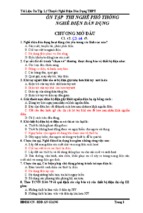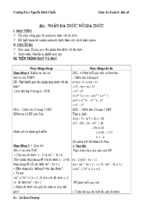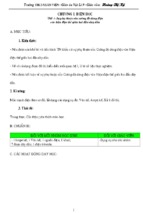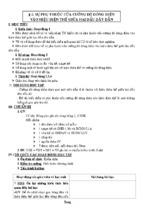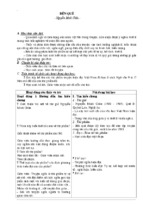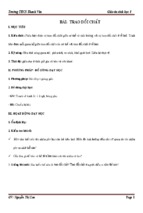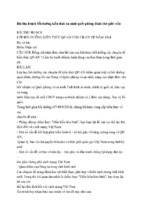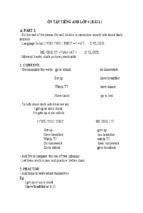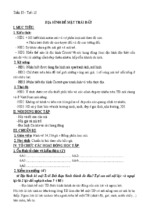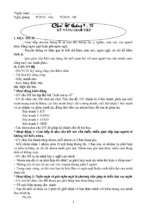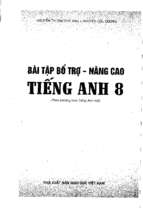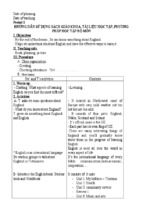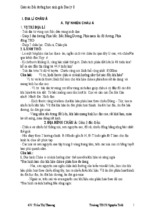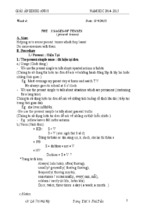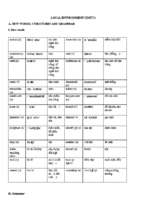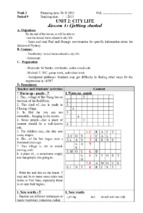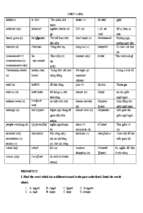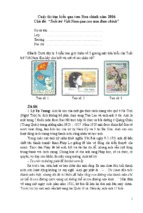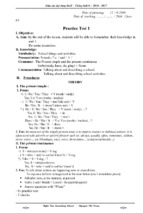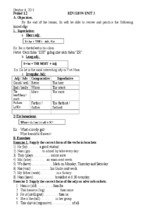Bài tập Tiếng Anh 8 học kì II nhằm giúp học sinh học tốt Tiếng Anh lớp 8 - Hệ thống toàn bộ các bài soạn và giải bài tập Tiếng Anh 8 hay nhất gồm đầy đủ các phần được biên soạn theo sách giáo khoa Tiếng Anh 8.
100 ENGLISH EXERSIES
Grade: 8
SECOND TERM
Teacher: Nguyễn Văn Dũng
Student: ……………………
1
2
LIST OF IRREGULAR VERBS
V1
Be
1.
(am, is,
V2
V3
was/
were
V1
V2
V3
Thì, là ở
been
Rời khỏi
41.
Leave
left
left
are)
2.
Become
became
become
trở nên
42.
Lend
lent
lent
Cho vay
3.
Begin
began
begun
Bắt đầu
43.
Let
let
Let
Để cho
4.
Bite
bit
bitten
Cắn
44.
Lose
lost
lost
Thua
5.
Blow
blew
blown
Thổi
45.
Make
made
made
Chế tạo
6.
Break
broke
broken
hỏng
46.
Meet
met
met
Gặp
7.
Bring
brought
brought
Mang
47.
Pay
paid
paid
Trả
8.
Build
built
built
xây dựng
48.
Put
put
put
Đặt
9.
Burn
Burnt
Burnt
Cháy
49.
Read
read
read
Đọc
10.
Buy
bought
bought
mua
50.
Ride
rode
ridden
Đạ x
11.
Catch
caught
caught
bắt
51.
Ring
rang
rung
Nhẫn
12.
Choose
chose
chosen
Chọn
52.
Rise
rose
risen
Tăng lên
13.
Come
came
come
đến
53.
Run
ran
run
Chạy
14.
Cut
cut
cut
cắt tỉa
54.
Say
said
said
Nói
15.
Do
did
done
làm xong
55.
See
saw
seen
Xem
16.
Draw
drew
drawn
Rút ra
56.
Sell
sold
sold
Bán
17.
Drink
drank
drunk
say
57.
Send
sent
sent
Gửi
18.
Drive
drove
driven
Lái xe
58.
Shine
shone
shone
Tỏa sáng
19.
Eat
ate
eaten
Ăn
59.
Show
showed
shown
Chỉ
20.
Fall
fell
fallen
rơi
60.
Sing
sang
sung
Hát
21.
Feed
fed
fed
nuôi
61.
Sit
sat
sat
Ngồi
22.
Feel
felt
felt
Cảm thấy
62.
Sleep
slept
slept
Ngủ
23.
Fight
fought
fought
chiến đấu
63.
Smell
smelt
smelt
Mùi
24.
Find
found
found
tìm
64.
Speak
spoke
spoken
Nói
25.
Fly
flew
Flown
Bay
65.
Spend
spent
spent
Tiêu
26.
Forget
forgot
forgotten
quên
66.
Spoil
Spoil /ed
Spiol / ed
Bị giật
27.
Get
got
got
có
67.
Stand
stood
stood
Đứng
28.
Give
gave
given
được
68.
Steal
stole
stolen
Lấy trộm
29.
Go
went
gone
Không còn
69.
Sweep
swept
swept
Quét
30.
Grow
grew
grown
mới lớn
70.
Swim
swam
swum
Bơi
31.
Hang
hung
hung
treo
71.
Take
took
taken
Lấy
32.
Have
had
had
Đã có
72.
Teach
taught
taught
Dạy
33.
Hear
heard
heard
nghe
73.
Tell
told
told
Nói
34.
Hide
hid
hidden
Ẩn
74.
Think
thought
thought
Nghĩ
35.
Hold
held
held
tổ chức
75.
Throw
threw
thrown
Ném
36.
Hurt
hurt
hurt
đau
76.
understood
hiểu
37.
Keep
kept
kept
Giữ
77.
Wake
woke
woken
Wake
38.
Know
knew
known
Nổi tiếng
78.
wear
wore
worn
mặc
39.
Lead
led
led
Dẫn
79.
Win
Won
Won
thắng
40.
Learn
learnt
learnt
đã
80.
Write
wrote
written
Viết
Understand
understood
3
LIST OF REGULAR VERBS
V1
V2
V3
V1
V2
V3
1.
Add
Added
Added
Thêm
41.
Mind
Minded
Minded
Tâm lý
2.
Advise
Advised
Advised
Khuyên
42.
Miss
Missed
Missed
Bị bỏ lỡ
3.
Arrive
Arrived
Arrived
đến
43.
Move
Moved
Moved
di chuyển
4.
Ask
Asked
Asked
Yêu cầu
44.
Need
Needed
Needed
Cần
5.
Attend
Attended
Attended
Tham dự
45.
Open
Opened
Opened
mở
6.
Attract
Attracted
Attracted
Thu hút
46.
Organize
Organized
Organized
Tổ chức
7.
Avoid
Avoided
Avoided
Tránh
47.
Paint
Painted
Painted
Sơn
8.
Behave
Behaved
Behaved
Cư xử
48.
Pass
Passed
Passed
Thông qua
9.
Believe
Believed
Believed
Tin
49.
Perform
Performed
Performed
Thực hiện
10. Borrow
Borrowed
Borrowed
Mượn
50.
Plant
Planted
Planted
Trồng
11. Change
Changed
Changed
Thay đổi
51.
Practice
Practiced
Practiced
Thực hành
12. Clean
Cleaned
Cleaned
Làm vệ sinh
52.
Prefer
Prefered
Preferred
Ưu tiên
13. Collect
Collected
Collected
Thu
53.
Prevent
Prevented
Prevented
Phòng ngừa
14. Cross
Crossed
Crossed
Vượt qua
54.
Promise
Promised
Promised
Hứa
15. Decide
Decided
Decided
Quyết định
55.
Protect
Protected
Protected
bảo vệ
16. Decorate
Decorated
Decorated
Trang trí
56.
Receive
Received
Received
Nhận
17. Depend
Depended
Depended
Phụ thuộc
57.
Rely
Relied
Relied
Dựa
18. Develop
Developed
Developed
Đã phát triển
58.
Remember
Remembered
Remembered
Nhớ lại
19. Divide
Divided
Divided
Chia
59.
Rent
Rented
Rented
Thuê
20. Discover
Discovered
Discovered
Phát hiện
60.
Report
Reported
Reported
báo cáo
21. Dislike
Disliked
Disliked
Không thích
61.
Request
Requested
Requested
Yêu cầu
22. Enjoy
Enjoyed
Enjoyed
Thích
62.
Return
Returned
Returned
Trả lại
23. Explore
Explored
Explored
khám phá
63.
Seem
Seemed
Seemed
Có vẻ
24. Fill
Filled
Filled
Đầy
64.
Smile
Smiled
Smiled
Mỉm cười
25. Finish
Finished
Finished
Đã kết thúc
65.
Start
Started
Started
Bắt đầu
26. Fit
Fitted
Fitted
Trang bị
66.
Stay
Stayed
Stayed
Ở lại
27. Gather
Gathered
Gathered
Thu thập
67.
Stop
Stopped
Stopped
dừng lại
28. Hate
Hated
Hated
Ghét
68.
Study
Studied
Studied
học
29. Help
Helped
Helped
giúp
69.
Suggest
Suggested
Suggested
Đề xuất
30. Hope
Hoped
Hoped
Hi vọng
70.
Talk
Talked
Talked
nói chuyện
31. Introduce
Introduced
Introduced
Giới thiệu
71.
Travel
Traveled
Traveled
Đi du lịch
32. Invent
Invented
Invented
Phát minh
72.
Try
Tried
Tried
thử
33. Join
Joined
Joined
Gia nhập
73.
Use
Used
Used
sử dụng
34. Learn
Learned
Learned
học
74.
Visit
Visited
Visited
truy cập
35. Like
Liked
Liked
Đã thích
75.
Wait
Waited
Waited
đợi
36. Listen
Listened
Listened
Nghe
76.
Want
Wanted
Wanted
truy nã
37. Live
Lived
Lived
Sống
77.
Wash
Washed
Washed
Rửa sạch
38. Look
Looked
Looked
Nhìn
78.
Watch
Watched
Watched
xem
39. Love
Loved
Loved
Yêu
79.
Weigh
Weighed
Weighed
Cân nặng
40. Manage
Managed
Managed
Quản lý
80.
Work
Worked
Worked
làm việc
4
UNIT 7: POLLUTION
A PRONUNCIATION:
I. Choose the word In each line that has different stress pattern.
1. A. scientific
2. A. national
3, A. prehistoric
4. A. medical
5. A. physical
B. dramatic
B. chemical
B. economic
B. hospital
B. horrific
C. athletic
C. medical
C linguistic
C. politic
C. beautiful
D. domestic
D. informal
D. optimistic
D. electric
D. different
B USE OF ENGLISH
II. Complete the words trader the pictures with ic or -al, thee mark the stressed syllable in each
word. Say the words aloud.
hero__
centr__
photograph___
education__
atom__
digit__
vocan__
arriv__
aquat__
tropic__
III. Put the correct words/ phrases in the box under each picture:
acid rain
sewage waste
global warming
factory fumes
ozone depletion
oil spill
deforestation
toxic waste
loud music
vehicle smoke
5
IV. Choose the best answer to complete the sentences:
1. If I (be) ………………… you, I (wear) …………………earplugs when going to the concert.
A. am / wear
B. am/will wear
C. was/ wore
D. were / would wear
2. Th …………… fish ar floating in th water..
A. die
B. dead
C. death
D. dying
3. Tr s' l av s ar damag d …………. acid rain.
A. because of
B. so
C. if
D. due
4. Nois pollution …………….. to a chang in animals’ living patt rn.
A. results
B. makes
C. leads
D. causes
5. The team success was larg ly ….. to h r fforts.
A. because
B. due
C. since
D. if
6. If th factory ………….dumping poison into th lak , all th fish and oth r aquatic animals will
die.
A. continues
B. continued
C. continue
D. will continue
7. If th air ……. dirty, I ……… so much.
A. wasn't / won't sneeze
B. isn't / wouldn't sneeze C. wasn't / wouldn't sneeze
D.
wasn't / didn't sneeze
8. Eating so much sugar can …….to h alth probl ms.
A. results
B. makes
C. leads
D. causes
9. Th y hav caus d s rious wat r ………….……………by dumping industrial wast into th lak .
A. pollute
B. polluted
C. polluting
D. pollution
10. The contamination water has led to the ……………..……….. of aquatic animals and plants.
A. death
B. die
C. dead
D. dying
11. …………..……………..fum s from th s v hicl s ar s rious air pollution
A. Poison
B. Poisonous
C. Poisoning
D. Poisons
12. Wat r pollution is th ……………..……….. of lak s; riv rs, oc ans, or groundwat r.
A. contaminate
B. contaminant
C. contaminated
D.
contaminating
III. Complete the sentences with the correct form of the verbs:
1. Th famous Sydn y Op ra Hous ………………. as an arts c ntr sinc 1973. (s rv )
2. Th r ar about 750 million English sp ak rs in th world, and this numb r ………………. fast,
(increase)
3. The Statu of Lib rty in N w York is a monum nt which…………………. fr dom, (symbolis )
4. England, Scotland, Wal s, and North rn Ir land tog th r ………….………. th Unit d Kingdom. (form)
5. N w Z aland ………………. divid d into th North Island and th South Island, (b )
6. Am rica Thanksgiving Day ………..……. on th fourth Thursday of Nov mb r sinc 1864.
(celebrate)
7. Be quiet! The baby (sleep) ................................... We seldom (eat) ................................... before
6:30
8. How long you (study) ................................... English? For 5 years.
9. I (wait) ................................... for two hours, but she (not come) ................................... yet.
10. They (live) ................................... in Ho Chi Minh City since 1975.
11. The Debating Competition (take place) ................................... in the Main Hall on April 3rd.
12. The bus for the excursion to the chocolate factory(leave) ................................... at 8.00 a.m on
April 14th.
13. Daisy (cook) ............................. some food in the kitchen at present. She always (cook)
...................... in the morning.
14. You (sleep) ................................... so far? I (ring) ................................... the bell for the last twenty
minutes.
15. He (write) ................................... a novel for two years, but he (not finish) ................................... it
yet.
16. The Public Speaking session (start) ............................. at 11.15 and(finish) ................................... at
12.45 tonight.
17. The Sports Festival (take place) ................................... on April 18th.
18. The school library (hold) ................................... the Photo Exhibition.
19. The Photo Exhibition (last) ................................... two days, from the 28th to the 29th of April.
20. Alaska, a stat in th USA, both (fac ) ……………………… th Arctic Oc an and th Pacific Oc an.
21. In Ad laid , south of Australia, th sun (not/ s t) ……………………………..until 9 p.m in summ r.
6
22. Although England has several good footbath teams, it (win) ……………………th World Cup only
once.
23. The government of New Zealand (do) ................................ a lot to preserve the culture of the
Maori, native people of this land.
24. In many cultures, it's considered rude if you push through people who (try) ...................................
to get out of a bus or a train.
25. When Saint Giong (lie) …………………….. on the bed, he (hear) …………………….. an announcement that
the emperor (need) …………………….. brave men to protect his land.
26. Alice was walking along in the woods when she suddenly (hear) ……………….……….. footsteps behind
her. Someone (follow) ………………….. her. she was frightened and she (start) ……….…………….. to run.
27. When the crowd (drop) ……………………….. the cheese, the fox (eat) …….………………….. it.
28. Th y (danc )…………….. m rrily wh n Cind r lla sudd nly (l av ) …………………….. the party.
29. Lac Long Quan (miss) …………………….. his life under the sea, so he (decide) …………………….. to take
fifty of his sons back there.
CONDITIONAL SENTENCES
Các loại câu điều kiện:
Type
Forms
1
If + S + V(s,es),
S + Will/Can/shall...... + Vo
Usage
Đk có thể xảy ra ở hiện tại ở tương lai
Tonight, tomorrow, n xt w k, this w k nd…
2
If + S + w r /was/ V2/ V d / didn’t Vo, Đk không có thật ở hiện tại
S +would/ Could/ Should...+ Vo
Now, today, this tim , ths y ar…
IV. Put the werbs in brackets into the correct form to complete the sentences.
1. If th local p opl drink th contaminat d wat r, th y (hav ) ………………………….. health problems.
2. If there were more trees in this area, the air (be) …………………………..fr sh r.
3. All th aquatic animals (di ) ………………………….. if p opl don't stop dumping s wag into th lak .
4. Global warming (not happ n) …………………………..if th r w r n't too much carbon dioxid in th
atmosphere.
5. If th sun (shin ) ………………………….., w will walk to the mountain.
6. If p opl (stop) …………………….digging th str t, th r wouldn't b nois pollution in this ar a.
7. P opl us a lot of cars and motorcycl s. If p opl (r duc ) …………………………..th us of motor
vehicles, there (be)
less serious air pollution.
8. If you (not r ad) …………………………..th s articl s, you (not know) …………………………..th facts about
water pollution.
9. If I (be) th pr sid nt, I (r mov ) …………………………..all th factori s out of th city.
10. Your brother (have)
h aring probl ms if h (list n) …………………………..to too loud music.
V. Write a conditional sentence type 1 for each situation.
If + subject+ V (present simple), subject + will/can/may/have to /must +V (bare infinitive)
1. We will recycle more. We will help the Earth.
If …………………………………………………………………………………………………………….
2. Factories will not dump waste into rivers. The government will fine them heavily.
If …………………………………………………………………………………………………………….
3. People will travel to work by bus. There will be fewer car fumes.
If …………………………………………………………………………………………………………….
4. We will save thousands of trees. We will not waste paper.
If …………………………………………………………………………………………………………….
5. We will use water carefully. More people will have fresh water.
If …………………………………………………………………………………………………………….
6. The land is polluted. The farmers are unable to grow crops.
If …………………………………………………………………………………………………………….
7. There is visual pollution. People build too many telephone poles and overhead power lines.
If …………………………………………………………………………………………………………….
7
8. People use contaminated water for cooking. Their health is badly affected.
If …………………………………………………………………………………………………………….
9. We place dustbins in many places. People don't throw rubbish everywhere.
If …………………………………………………………………………………………………………….
10. The industrial waste is well-treated. The factory installs a new filtration system
If …………………………………………………………………………………………………………….
VI. Write a conditional sentence type 2 for each situation, as in the example.
If + subject+ V (past simple), subject + would/could/might +V (bare infinitive)
1. We turn on the heater all the time. We have to pay three million dong for electricity a month.
If …………………………………………………………………………………………………………….
2. The karaoke bar makes so much noise almost every night. The residents complain to its owner.
If …………………………………………………………………………………………………………….
3. I am not you. I don’t look for a new place to live.
If …………………………………………………………………………………………………………….
4. Lan is ill. She do sn’t join our tree planting activity.
If …………………………………………………………………………………………………………….
5. There are more cars on the road. There is more pollution.
If …………………………………………………………………………………………………………….
6. There are so many billboards in our city. People cannot enjoy the view.
If …………………………………………………………………………………………………………….
7. There is so much light in the city at night. We cannot see the stars clearly.
If …………………………………………………………………………………………………………….
8. She has a headache after work every day. She works in a noisy office.
If …………………………………………………………………………………………………………….
9. The factory is located near our village. There is air pollution and noise pollution
If …………………………………………………………………………………………………………….
10. The local people have to use water from the polluted river. They don't have fresh water.
If …………………………………………………………………………………………………………….
11. Trees and grasses cannot grow here. The soil is badly polluted
If …………………………………………………………………………………………………………….
12. Mr. Quang works in a noisy environment. His hearing becomes worse.
If …………………………………………………………………………………………………………….
13. There is serious water pollution. The factory doesn't treat its waste well
If …………………………………………………………………………………………………………….
C. READING
I. Read the paragraph and choose the correct answer A, B, or c for each of the gaps.
Australia is a country in th South rn H misph r (1) ……. compris s th mainland of th Australian
continent the island of Tasmania, and many smaller islands in the Indian and Pacific
Oceans.
N ighbouring countri s (2) ……. Indon sia. East Timor, and Papua N w Guin a (3) ……. th north, th
Solomon Islands, Vanuatu. New Caledonia to the northeast, and New Zealand to the southeast.
Australia (4) …….
six stat s and two major mainland t rritori s. Th (5) ……. city of Australia is
Canb rra. With a (6) ……. of ov r 380.000, It is Australia’s larg st inland city and th ighth larg st
Australian City ov rall Th (7) ……. city in Australia and Oc ania s Sydn y, with a population of over
4.700.000 It is
(8) ……. th stat capital of N w South Wal s. and 15 locat d (9) ……. Australia’s south ast coast along
th Tasman S a. (10) ……. larg Citi s ar th mainland Slat capitals: M lbourn , Brisban , P rth, and
Adelaide.
1. A. who
B. where
2. A. include B. contain
C. which
C. has
6. A. pollution B. population C. people
7. A. large
B. larger
C. largest
3. A. on
C. by
8. A. also
B. to
8. too
C. so
8
4. A. has
B. takes
5. A. capital B. urban
C. gets
C. rural
9. A. in
10. A. Other
B. on
B. Others
C. to
C. Another
II. Read and choose the correct Answer A, B, or C for the questions
Alaska is perhaps the most amazing state In the USA. It has coastlines facing both the Arctic Ocean and
the Pacific Ocean. This state has an incredible throe million lakes. That's four lakes per person living
there.
Many cities in Alaska cannot be reached by road, sea, or river. The only way to get in and out is by air,
on foot, or by dogsl d. That’s why Alaska has th busi st s a airport in th world, Lak Hood S aplan
Base. Nearly two hundred floatplanes take off and land on the water of this airport every day. It's
really a fun scene to watch.
Alaska is called the Land of the Midnight Sun because in summer, the sun does not set for nearly three
months. But in winter the sun stays almost unseen.
All Alaskan take special pride in their beautiful and unique state.
1. Alaska ………..
A. is another name for the USA
B. is an island in the Pacific Ocean
C. has coastlines facing both the Pacific and the Arctic Oceans
2. Which statement below is NOT correct?
A. In Alaska, the number of lakes is bigger than that of people.
A. There is one lake for each person living there.
C. Alaska has an incredibly high number of lakes.
3. Which method below can always be used to reach a place in Alaska?
A. by air
B. by road
C. by river
4. In Alaska we can always see the sun
A in winter
B. in summer C. every month of the year
III. Read the passage and answer the questions:
Visual pollution has a greater effect on people than you may think.
I remember when I went to a foreign city. I was really scared because there was so much graffiti on the
buildings' walls. Then I looked up, and I saw a lot of power lines over my head. Although they were not
dangerous, I still felt insecure since I thought they might fall down. These things prevented me from
enjoying the beautiful sights of the city.
I also remember the time I studied in Melbourne. Once I was so busy with my assignments that I did
not tidy my room for two weeks. Looking at the messy room caused me so much stress that I did not
want to study. Then I decided to clean the room and put my things in their proper places. I also bought
a small plant and placed it in a corner. These simple actions increase- my motivation and helped me to
focus on my learning.
What about you? Have you ever been affected by visual pollution?
1. Does visual pollution have a great effect on people?
……………………………………………………………………………………………….…………………….………….
2. Why was the author scared when she was in a foreign City?
………………………………………………………………………………………………….…………………….……….
3. What did she see when she looked up?
……………………………………………………………………………………………….…………………….………….
4. How did she feel then?
……………………………………………………………………………………………….…………………….………….
5. Why did she have that feeling?
……………………………………………………………………………………………….…………………….………….
6. What did these things affect on her?
……………………………………………………………………………………………….…………………….………….
7. What was she so busy with?
……………………………………………………………………………………………….…………………….………….
8. What happened when she looked at the messy room?
……………………………………………………………………………………………….…………………….………….
9
9. What did she do for her room?
……………………………………………………………………………………………….…………………….………….
D. WRITING
1. Write an article describing causes, effects and solutions to air pollution.
Suggested: Water pollution
a. Intrroduction
b. Write some causes or effects of water pollution
Causes:
- Factories dump industrial waste into lakes and rivers.
- Sewage from households.
- Farms using pesticides to kill insects and herbicides to kill weeds.
- People throw trash onto water.
- Oil spills come from ship
- People using pesticides and herbicides to catch fish.
Effects:
- Outbreaks of cholera and other diseases.
-The death of aquatic animals such as fish,crabs or birds.
- Herbicides in water can kill aquatic plants.
c. Conclusion.
Residents in our area have been concerned this problem. Therefore, we are trying to find out how to
solve it.
_____________________________________________________________________________
_____________________________________________________________________________
_____________________________________________________________________________
_____________________________________________________________________________
_____________________________________________________________________________
_____________________________________________________________________________
_____________________________________________________________________________
_____________________________________________________________________________
_____________________________________________________________________________
_____________________________________________________________________________
_____________________________________________________________________________
_____________________________________________________________________________
_____________________________________________________________________________
Topic sentences: There are many kinds of pollution. However, air pollution is the most serious in our
area.
Causes: Air can be polluted in many ways. First of all, smokes in the air from mills, factories, and
industry make the air poisonous. Secondly, air is polluted by toxic fumes from vehicles. Besides,
poisons from household families are another cause of air pollution as it contains harmful chemicals.
Finally, yearly forest fires nearby also lead to air contamination as well.
Effects: Air pollution badly affects our area. Air pollution makes us face with many diseases such as
headaches, asthma and lung diseases. There are some new factories in our neighborhood making
people living nearby become sick as they breathe smokes too much. Another negative effect is that
acid rain due to air pollution is so dangerous because it destroys the leaves of plants. In addition, air
pollution also harms animals, fish and other aquatic life. They become sick and develop their
population more slowly than they did before.
Solutions: Residents in our area are trying to find out how to solve it. We decide to use public means
of transportation and local gov rnm nt ncourag s us to fulfill th 3 R: ‘R duc , R us and R cycl ”.
2. Write an article describing causes, effects and solutions to water pollution.
Topic sentences: Water pollution is the contamination of bodies of water such as lakes, rivers, oceans,
and groundwater.
Causes: Water pollution can have many different causes. Firstly, factories dump industrial waste into
lakes and rivers. Secondly, Sewage from households is another cause. Also, farms using pesticides to
10
kill insects and herbicides to kill weeds can also lead to water pollution. Furthermore, storm water and
the atmosphere also result in 'non-point source" pollution.
Effects: Water pollution can have dramatic effects. People easily get cholera and other diseases or
even die if they drink untreated and contaminated water. Polluted water also makes aquatic animals
die such as fish, crabs, or birds. Other animals may also get sick because of eating these dead animals.
In addition, herbicides in water can kill aquatic plants and cause further damage to the environment.
Solutions: This problem can be reduced by giving heavy fines to companies that do this, educating
companies about the environment and giving tax breaks to companies that find ‘ cl an ’ ways to
dispose of their waste. If we take these actions/ measures well, we will make our water clean and safe
again.
11
UNIT 8. ENGLISH SPEAKING COUNTRY
A PRONUNCIATION:
I. PRONUNCIATION: Stress in words ending in -ese and –ee. Mark the stress in the underlined words.
Cantonese
Taiwanese
Japanese
Portuguese employee
adoptee
coffee
addressee
interviewee Chinese.
refugee
trainee
Japanese
guarantee.
II. Mark the stress in each word.
artistic
athletic
historic
historical
logical
physical
heroic poetic
botanic
botanical
Nepalese
musical
photography athletic
technology referee
economic
biology
Japanese
geography
physical
III. Choose the word in line that has different stress pattern.
1. A. coffee
B. rupee
C. trainee
D.agree
2. A. kangaroo
B. Taiwanese
C. guarantee
D. symbolise
3. A. Maltese
B. festive
C. degree
D. unique
4. A. government
B. celebrate
C nominee
D.popular
5. A. Canadian
B. introduce
C. Guyanee
D. absentee
B USE OF ENGLISH
I. Complete the words under the pictures with ees or -eese, then mark the stress syllable in each
word. Say the words aloud.
12
II. Put the correct word in the box under each picture.
Aborigine
bagpipe
kiwi
koala
maple leaf
the Maori
double-decker bus
kilt
emus
fish & chips
13
II. Complete the sentences with the words in the box.
accent
brigade
cattle
fence
football
igloo
loch
monument native
symbol
1. The silver fern is a national _____________ of New Zealand.
2. Mount Rushmore is a national_____________ carved into a mountain in South Dakota, USA,
3. Trung speaks English like a_____________though he comes from Viet Nam, sometimes thought
John's sounded English, sometimes American.
4. In Scotland, the word "_____________ " is used to describe any large, enclosed expanse of water,
5. It took six years to build the rabbit-proof _____________ in Australia,
6. England is the original home of_____________ because the sport was invented there.
7. Edinburgh, Scotland was the first city in the world to have its own fire _____________ in 1824.
8. Anna Creek Station in South Australia is the world's largest_____________ station with an area of
24,000 km2.
9. An_____________ is a type of shelter built of snow by the Inuit, the Aboriginal peoples in Canada.
10. Visitors can spend_____________ days exploring amazing END natural beauty of New Zealand.
III. Complete the sentences with the correct form ©I the verbs In present tenses
(present simple, present continuous m present perfect).
A koala (spend) _____________ about 18-20 hours sleeping in tree forks.
It's only my first week in Wales, and I (see) _____________ so many interesting things already.
The number of kiwis in this area (decrease) _____________ quickly.
The Aborigines (live) _____________ in Australia for more than 40,000 years.
Most European citizens (not have) _____________ to apply for a visa to visit Canada.
At the moment, thousands of people (gather) _____________ in Trafalgar Square, London to
celebrate St Patrick's Day.
The kangaroo (become)
a symbol" of Australia since 1773.
The bald eagle, an American symbol, (not live)
in
any other
places
besides North America.
I think Mr. Viet (not be) _____________ to Northern Ireland
IV. Use the verbs in the box in present simple tense to complete the sentences.
arrive be
have leave open
retire return rise
start visit
1. The plane from Washington D£. to Ottawa_____________ in fifteen minutes,
2. The Sydney Country Music Festival_____________ on the first Saturday of next month.
3. Mr. Nam_____________ breakfast with the president of the United States tomorrow.
4. As you are in Vancouver now, the sun_____________ a minute earlier tomorrow.
5. The train (not) _____________ in Edinburgh at 11 tonight as it departed late.
6. There_____________ another bus to Canberra in half an hour.
7. Mr. and Mrs. Wilson_____________ to California this weekend.
8. My brother_____________ work in Liverpool next Monday.
9. We_____________ the Goiden Gate Bridge in San Francisco on day 6.
10. I think that Julia's father_____________ in two years.
V. Choose the best answer to complete each of the following sentences.
1. The Statue of Liberty is a major monument in New York which _____________
freedom.
A. attracts
B. symbolises
C. decides
D. understands
2. Like the kangaroo and koala, the platypus is a_____________ animal in Australia.
A. scenic
B. tailless
C. foreign
D. unique
3. David uses English as his mother _____________ because he comes from the UK.
A. Tongue
B. mouth
C. nose
D. teeth
4. The Sydney Opera House is an_____________ of Australia's creative and technical achievement
A. orchestra
B. emblem
C. icon
D. armorial
5. The government of New Zealand has done a lot to_____________ the culture of the Maori.
A. preserve
B. surround
C. puzzle
D. pronounce
6. Coming to Scotland, visitors can drive through vast green_____________.
14
lochs
B. stations
C. castles
D. pastures
How is your holiday in New Zealand? _____________
Really
B. Awesome
C. Absolutely right
D. Sure
8. The flight number 781 to Melbourne_____________ at 9 o'clock tomorrow morning.
arrives
B. is arriving
C has arrived
D. will arrive
9. Some documents say that people_____________ the Glastonbury Festival since the
10. beginning of the 19th century
celebrated
B. were celebrating C. have celebrated D. celebrate
11. We_____________ on the Great Ocean Road, an Australian National Heritage at the moment
A. will drive
B. drive
C have driven
D. are driving
VI. Complete the sentences with the correct form of the verbs (present simple, present continuous
or present perfect)
1. Th famous Sydn y Op ra Hous ………………. as an arts c ntr sinc 1973. (s rv )
2. Th r ar about 750 million English sp ak rs in th world, and this numb r ………………. fast,
(increase)
3. Th Statu of Lib rty in N w York is a monum nt which…………………. fr dom, (symbolis )
4. England, Scotland, Wal s, and North rn Ir land tog th r ………….………. th United Kingdom. (form)
5. N w Z aland ………………. divid d into th North Island and th South Island, (b )
6. Am rica Thanksgiving Day ………..……. on th fourth Thursday of Nov mb r sinc 1864.
(celebrate)
7. Be quiet! The baby (sleep) .............................. We seldom (eat) ................................ before 6:30
8. How long you (study) ................................... English? For 5 years.
9. I (wait) ................................... for two hours, but she (not come) ................................... yet.
10. They (live) ................................... in Ho Chi Minh City since 1975.
11. The Debating Competition (take place) ................................... in the Main Hall on April 3rd.
12. The bus for the excursion to the chocolate factory(leave) ................... at 8.00 a.m on April 14th.
13. He (not, be) ................................... here since Christmas, I wonder where he (live)
................................... since then.
14. Look! A man (run) ................................... after the train. He (want) ................................... to catch
it.
15. The sun (set) ............................. in the West. It (be) ................................. often hot in Summer.
16. My mother sometimes (buy) ................................... vegetables at this market.
17. It (rain) ................................... much in summer. It (rain) ................................... now.
18. Daisy (cook) ............................. some food in the kitchen at present. She always (cook)
...................... in the morning.
19. Jack (go) ................................... to Paris for a holiday. He never (be) ................................... there.
20. You (sleep) ................................... so far? I (ring) ................................... the bell for the last twenty
minutes.
21. He (write) .............................. a novel for two years, but he (not finish) .............................. it yet.
22. Mary (lose) ................................... her hat and she (look) ................................... for it until now.
23. I (see) ................................... that film several times because I like it.
24. The Public Speaking session (start) ............................. at 11.15 and(finish) ................................... at
12.45 in Room 6, Felix Building.
25. The Sports Festival (take place) ................................... on April 18th.
26. The Association of School Newspapers (host) ................................... the opening of their
Journalism Club on April 26th, in the school library.
27. The school library (hold) ................................... the Photo Exhibition.
28. The Photo Exhibition (last) ................................... two days, from the 28th to the 29th of April.
B. READING
I. Read the passage again and answer the questions.
7.
Scotland is in the north of Great Britain. It is famous for its rich culture as well as its amazing natural
beauty. Visitors to this land can spend endless days exploring its historic centuries-old castles. But be
15
aware - legend says that some of them are haunted by ghosts. Fun-lovers can experience its worldfamous festival, the Highland Games where they can enjoy unique Scottish activities such as the piping,
drumming, and dancing. They can also see traditional sports, or drink whisky with the local people.
Driving through vast green pastures, or boating on scenic lakes - or lochs - are other attractions that
Scotland offers.
The great people of this legendary land have also given many of the world's important inventions like
the telephone, the television, penicillin and the raincoat. Edinburgh, the capital, was the first city in the
world to have its own fire brigade in 1824. Edinburgh University welcomed the first female medical
student in Great Britain in 1869.
Where is Scotland?
1. What is this land famous for?
_____________________________________________________________________________
2. Is Scotland famous for its rich culture?
_____________________________________________________________________________
3. What might you see while you are exploring a castle?
_____________________________________________________________________________
4. What are some activities you can see at the Scottish Highland Games?
_____________________________________________________________________________
5. What were some of the things invented by the Scots?
_____________________________________________________________________________
6. When was the first fire brigade in the world created?
_____________________________________________________________________________
II. Read the passage again and answer the questions.
Alaska is perhaps the most amazing state in the USA. It has coastlines facing both the Arctic Ocean and
the Pacific Ocean. This state has an incredible three million lakes. That's four lakes per person living
there.
Many cities in Alaska cannot be reached by road, sea, or river.The only way to get in and out is by air,
on foot, or by dogsied. That's why Alaska has the busiest sea airport in the world, Lake Hood Seaplane
Base. Nearly two hundred floatplanes take off and land on the water of this airport every day. It's
really a fun scene to watch.
Alaska is called the Land of the Midnight Sun because in summer, the sun does not set for nearly three
months. But in winter the sun stays almost unseen.
All Alaskans take special pride in their beautiful and unique state.
1. What is Alaska?
_____________________________________________________________________________
2. Where do floatplanes take off and land?
_____________________________________________________________________________
3. Why do p opl call Alaska ‘Land of th Midnight Sun’?
_____________________________________________________________________________
4. How do the Alaskans feel about their state?
_____________________________________________________________________________
IV. WRITING:
1. Describing a schedule for a visit or a tour in Viet nam (60 - 80 words) .
Suggestion for activities:
Seeing some of the sights of the city
Exploring a famous place.
Visiting the National Children's Museum.
Cycling in the National Park.
Enjoying a b autiful sight/ sc n ry som wh r ( x. Lak s, Riv rs, R sorts, Mounts….)
Doing some shopping at some supermarket or mall.
Going for a nic lunch at som r staurant….
Attending a local festival with many traditional games .
16
Experiencing the exciting feelings at somewhere.
Your opinions:
What the brochure says.
How the trip will be
You can start with:
This is the schedule for our group's two-day visit to Washington D.C.
On th first day w plan to …………………………………………………………….. This way, w avoid th crowds.
Th n w ……………………………………………….…………………………………………………………………………………. Th n w
………………………………………………………….………………………………………………………………………………………….
On th s cond day, w ………………..…………………………………………………………………………………………………….
In th aft rnoon, w ……………………………….………………………………………………………………………………………...
Th brochur says that ………………………..…………………………………………………………………………………………….
________________________________________________________________________________
________________________________________________________________________________
________________________________________________________________________________
________________________________________________________________________________
________________________________________________________________________________
________________________________________________________________________________
________________________________________________________________________________
________________________________________________________________________________
________________________________________________________________________________
________________________________________________________________________________
This is the schedule for our group's two-day visit to Washington D.C. On the first day we plan to go to
the White House early at 8 o'clock. This way, we avoid the crowds. Then we get on a Hop-on Hop-off
trolley, which rides around the city. We do some shopping and go for a nice lunch. Then we see some of
the sights of the city. On the second day, we take the 8.30 shuttle bus to the canoe club to join a canoe
trip along the C&O canal. This canal is famous for its beautiful scenery, especially in autumn. The trip
takes about three hours. In the afternoon, we visit the National Children's Museum. The brochure says
that this museum offers children a lot of fun activities where they can learn through playing.
17
UNIT 9: NATERAL DISASTER
A. PRONUCIATION:
Stress in words ending in -logy, -grahpy. Mark the stress in the underlined words.
tech'nology photography
ecology
biology
climatology demography
apology
biography
geography
psychology bibliography sociology
zoology
astrology
I. Choose the word In each line that has different stress pattern
1. A. ecology
B. environment
C. autography
D. residential
2. A. physiography
B. alternatively
C. criminology
D. unsuccessfully
3. A. temporary
B. geology
C emergency
D. logography
4. A. astrology
B. unnatural
C. medication
D. demography
5. A. voluntary
B. apology
C. autography
D. residential
B. USE OF ENGLISH:
I. Complete the words She pictures with logy or graphy then mark the stress syllable in each word.
Say the words aloud.
18
II. Match the natural disasters with the pictures.
drought
earthquake flood
forest fire
volcanic
eruption
tornado
tsunami
typhoon
lightning
landslide
1
2
3
4
5
6
7
8
9
10
III. Fill in each blank with a suitable verb in the correct form from the box below. Then listen, check
and repeat.
rage
bury
collapse erupt
striKe
shake
Yesterday, a terrible storm ______________ the rural area of Ha Giang Province.
Villagers rushed into public shelters as soon as the volcano______________.
Hundreds of buildings were completely destroyed when the earthquake______________ the city.
The mudslide ______________ the whole village while people were still sleeping in their houses.
The forest fire ______________ for eight hours
and some animals were badly injured or killed.
We managed to run out of the house into the street before the walls ______________
IV. Use the phrases in the correct form to complete the sentences scatter
Scatter
take evacuate
put out
provide
1. The rescue workers set up a camp to______________ for the flood victims.
2. On the second day, there was a rainstorm which helped to______________.
3. When the storm started, they
______________ in a cave.
4. As the tornado moved through the town, high winds______________ across the streets.
5. The police had to______________ to public shelters before the volcano started to erupt.
V. Choose the best answer A, B, or c to complete each sentence.
1. What can be done to protect people from ________ disasters?
A. environment B. environmental
C. environmentally
D. environmentalist
2. Emergency teams are still clearing the from the plane crash.
A. debris
B. dust
C piece
D. waste
3. The government is sending___ to the flood victims.
A. touch
B. aid
C. accommodation
D. provision
4. Much of the town was rebuilt after the massive_______________ of the tornado.
A. peace
B. humour
C. destruction D. safety
5. New Zealand rescue services carried out several searches for _______________ :
A. movers
B. helpers
C. rescuers
D. survivors
19
6. Hie government has dedared a state of_______________ following the earthquake.
A. accident
B. situation
C. extension
D. emergency
7. The_______________ are searching through the rubble for survivors.
A. rescuers
B. washers
C. fighters
D. builders
8. Many countries have sent humanitarian aid to the earthquake_______________.
A. victims
B. soldiers
C. elders
D. rescuers
9. Thousands of buildings and houses were completely destroyed when the earthquake _____ the city.
A. fought
B. struck
C. happened
D, arrived
10. The forest fire _______________ for eight hours, killing all of the animals.
A. burst
B. occurred
C. raged
D. spread
11. An example of a natural disaster is a _.
A. snowfall
B. tornado
C. thunder
D. rainbow
12. A severe topical____is called a typhoon.
A. drought
B. rain
C. flood
D. storm
13. Dozens of buildings_when an earthquake measuring 7.2 on the Richter scale hit the city
A. destroyed
B. collapsed
C. buried
D. damaged
14. Hundreds of people were made_after the flood.
A. homeless
B. helpless
C careless
D. endless
15. We cannot present natural disasters, but we can_for them.
A. defeat
B. invent
C. struggle
D. prepare
16. - "No one was killed in the forest fire two days ago".
A. Oh dear
B. That's shocking
C. That's a relief
17. Thousands of people_by natural disasters every year.
A. are affected B. are affecting
C. have affected
18. The roof of the building_in a storm a few days ago.
A. damaged
B. was damaged
C, has damaged
19. All the villages_to safe areas before midnight last night
A. evacuated
B. were evacuated C. had evacuated
20. As soon as the fioodwaters_down, people __their houses.
A- went - cleaned
B. had gone – cleaned
C. went - had cleaned
D. How terrible
D. were affected
D. has been damaged
D. had been evacuated
D. had gone - had cleaned
Grammar: IX. PAST PERFECT TENSE
THÌ QUÁ KHỨ HOÀN THÀNH
1. Côn t ức sử dụn thì quá khứ hoàn thành
Khẳng định
Phủ định
Nghi vấn
S + had + V3
S + (hadn’t) + V3
S + had + Chủ ngữ + V3
I, You, He, She, We, They had
finished before I arrived.
I, You, H , Sh , W , Th y hadn’t
eaten before he finished the job.
What had he, she, you, we,
they thought before I asked
the question?
2. Các sử dụn t ì quá k ứ oàn t àn
20
- Xem thêm -

